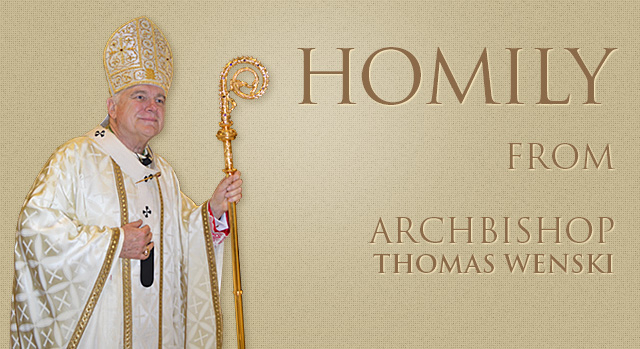By Archbishop Thomas Wenski - The Archdiocese of Miami
Homily by Archbishop Wenski at Mass at St. John Vianney College Seminary for the beginning of a new academic year. August 30, 2015.
In his Exhortation, the Gospel of Joy, Pope Francis criticizes those "sourpusses" that we sometimes find in the Church. I'm sure we all know who they are — those people who would take the joy out of Easter Sunday. The Pharisees and the Scribes were the sourpusses of Jesus' day. They made religion a burden rather than a blessing. Sometimes these sourpusses can be very zealous — as the Pharisees were — but their zeal, like that of the Pharisees, is a "bitter zeal." You can see this bitter zeal in those who point out peoples' faults not so much to help them but to humiliate them, to put them down.
Do people look at us Catholics today — and instead of seeing Jesus reflected in our lives and our actions see something of the Pharisee or Scribe? Apparently, many people do see us in this way — they think our Catholic faith is just about a bunch of rules and regulations that they don't understand and certainly don't want to follow. I am not saying that our religion doesn't have its share of rules and regulations, and some are less important than others. But every society has its rules — that's the only way you can have people live and work together. When I was in the seminary, a professor told me: “Keep the rules and the rules will keep you.”
The rules and regulations are means to an end — rather than the end itself. When we confuse "ends" and "means" we can fall into the error of the Pharisees and Scribes — we can fall into legalism, and we can fall into the type of religious hypocrisy that Jesus criticized in very strong terms.
For Jesus, religion is always more than external practices and observances, it is more than “just going through the motions”. We learn in the First Reading, God through Moses gives his people the commandments to be life giving – following the commandments is not to make us “self-righteous” but to help us be in a “righteous relationship” with God and with our neighbor. In the responsorial psalm we prayed: “The one who does justice will live in the presence of the Lord.”
As St. James says in today’s second reading, “religion that is pure and undefiled before God and the Father is this: to care for orphans and widows in their affliction and to keep oneself unstained by the world.” This requires much more that “going through the motions” of a few external religious practices and observances. It requires a real change of heart.
For this reason, Christianity is first and foremost a religion of the heart. Jesus insists that it is not what goes into a man’s mouth that defiles him; rather it is what can come from the heart. There is a lot of evil and human suffering in the world; and since the source of that evil and suffering is found in the human heart any project of social reform, any program to make a better world must begin with the conversion of hearts – and that means first of all my own. If you want your family to be a better family, begin by making yourself a better part of it. Rather than allowing yourself – like the Pharisees – to be consumed by a bitter zeal because of the shortcomings of others be the change you want to see in others.
As you begin this academic year, I commend all of you to the priestly intercession of this seminary’s patron saint, St. John Marie Vianney, the Cure d’Ars. He often gave this advice to those who sought his counsel: “Do only what can be offered to the Lord”. That’s certainly a rule of life that will keep you on the right path. Doing only what can be offered to the Lord is taking the program of formation here seriously and not just to go through the motions. The goal of seminary formation is not to produce “self-righteous” sourpusses but rather joyful disciples who are committed and apostles who are effective because they stand in a righteous relationship to God and their neighbor.

